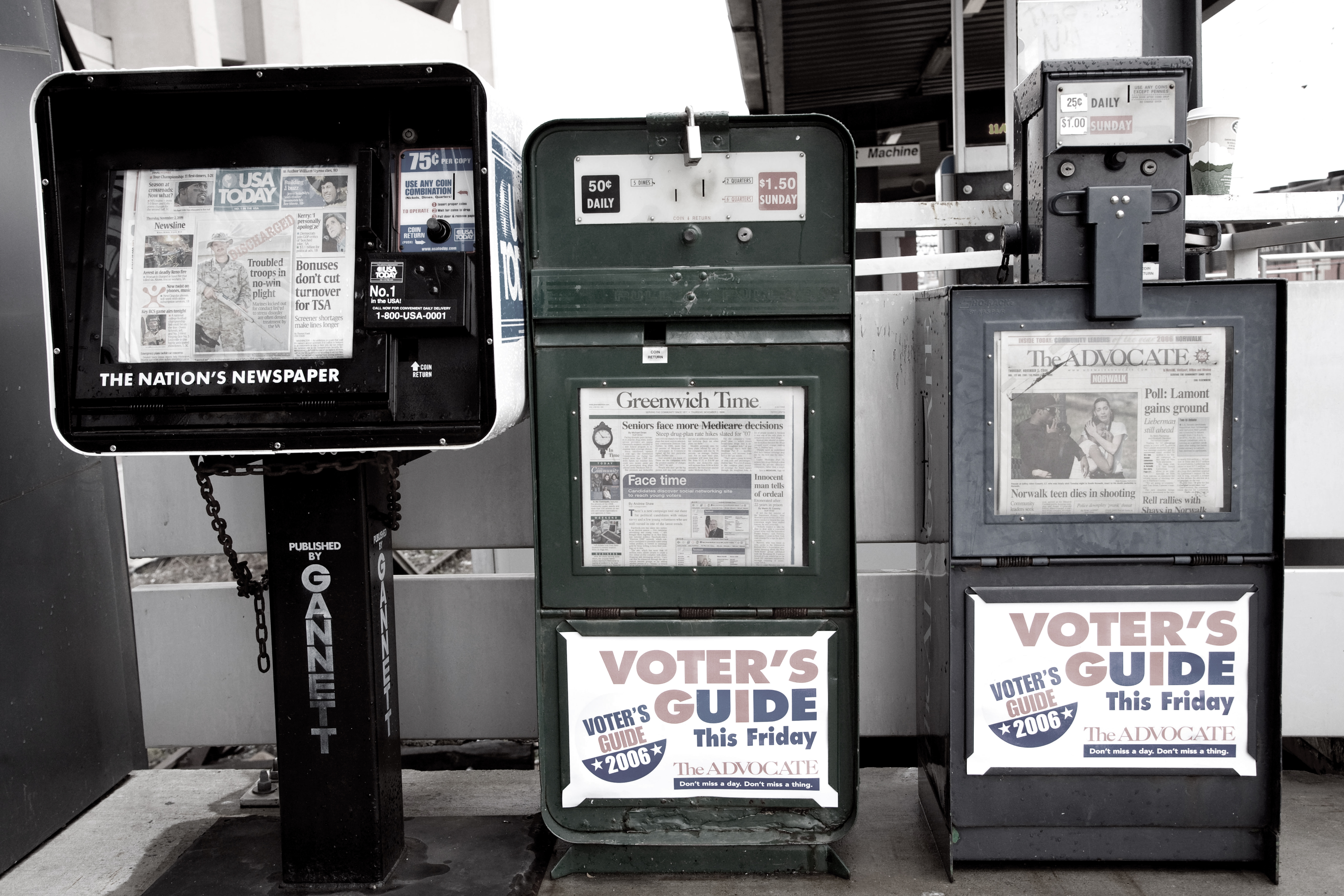The death of local news
The watchdogs of America's local and state governments are disappearing. Can they be saved?

The watchdogs of America's local and state governments are disappearing. Can they be saved? Here's everything you need to know:
What's the state of local news?
It's a shell of its former self. The weekday circulation of U.S. newspapers has been in steady decline since 1998, when it was 62.7 million. Today their print and digital circulation combined reaches only about 31 million, according to the Pew Research Center. Fewer readers means less subscription revenue, but it's the crash in advertising revenue that's been most painful. Newspapers' ad revenue plummeted from $48 billion in 2000 to $16.5 billion in 2017. Local newspapers that were once community institutions were forced to slash budgets and staff, and many folded entirely. Even in major cities, local news is struggling. The Pittsburgh Post-Gazette just cut its print editions from seven days a week to five, and the venerable New York Daily News laid off about half its staff in July, a move the tabloid's corporate parent, Tronc, said was made to "reflect the realities of our business." Newsrooms employ almost 40 percent fewer people than they did in 1994, and "newspaper reporter" was rated "the worst job in America" for four years running, according to CareerCast, which ranks jobs based on factors such as stress, risks, compensation, and opportunity for growth.
The Week
Escape your echo chamber. Get the facts behind the news, plus analysis from multiple perspectives.

Sign up for The Week's Free Newsletters
From our morning news briefing to a weekly Good News Newsletter, get the best of The Week delivered directly to your inbox.
From our morning news briefing to a weekly Good News Newsletter, get the best of The Week delivered directly to your inbox.
What caused local news' decline?
More than anything else, the internet. Older readers continue to buy newspapers, but younger readers who grew up expecting free online content and constantly updated news aren't inclined to pay for a printed product. As readers began defecting to online sources in the early 2000s, Craigslist made paid newspaper classified ads all but obsolete with its mostly free message boards. Classifieds once generated up to 40 percent of newspaper ad revenue, peaking at $19.6 billion in 2000. Revenue from consumer ads, meanwhile, has been gobbled up by the twin behemoths of Google and Facebook, which together accounted for 73 percent of all digital advertising in 2016, according to the Pivotal Research Group. Still another threat comes from niche new-media startups that see opportunity in local newsrooms' vulnerability. Alex Mather, co-founder of the subscription-based sports website The Athletic, told The New York Times his deep-pocketed company plans to poach the best local sports reporters in every city. "We will wait every local paper out and let them continuously bleed until we are the last ones standing," Mather said.
Why didn't local papers adapt?
In many small and midsize cities, multiple generations of the same wealthy family commonly owned the local paper, often treating it as a public service rather than an exclusively for-profit venture. But as the internet began devouring their revenue, many waited too long to react, and the losses became unsustainable. Corporations and venture capitalists began to buy up local news outlets, often treating them as mere short-term investments. One such so-called vulture capitalist, Randall Smith, purchased several major regional papers — including The Denver Post, the San Jose Mercury News, and The Orange County Register — then slashed operations to the bone to maintain profitability. As Jack Shafer wrote in Politico, Smith decided that "more value can be extracted by sucking the marrow" of the papers than by reinvesting in them.
A free daily email with the biggest news stories of the day – and the best features from TheWeek.com
Do we still need local news?
Only if things like schools, taxes, infrastructure, and government accountability matter to you. Where fewer reporters cover local business and government, Margaret Sullivan warned in The Washington Post, "corruption can flourish, taxes can rise, public officials can indulge their worst impulses." When a local newspaper shutters, that same community experiences increased government waste and inefficiency, according to a 2018 report released by the Social Science Research Network. The loss of local reporting also depresses most citizens' engagement in state and local politics, leading to activists dominating the parties and greater political polarization. A 2015 Brookings Institution report found voters are less likely to cast ballots in congressional races that receive little coverage, producing more landslide contests and members of Congress who have less incentive to compromise on Capitol Hill. Conversely, robust coverage of local elections leads to greater voter turnout and more civic engagement.
Can local news be saved?
Only if creative innovations take hold. Some local newspapers have instituted "paywalls" requiring frequent readers to cough up money; digital revenue, however, hasn't made up for the massive loss of print revenue. The nonprofit ProPublica is providing cash grants to help local newsrooms pursue ambitious investigative projects, and its Local Reporting Network will expand in 2019 to support coverage of state governments. Veteran journalist Don Day spent the past year researching potential local news lifesavers and found inspiration from 19th-century industrialist Andrew Carnegie, who gave away most of his fortune late in his life, with a focus on funding public libraries. Day hopes Carnegie's example could serve as a model for wealthy philanthropists who would fund an $8 billion endowment to maintain local news operations in both large towns and smaller rural areas. It may be the only way, Day says, to keep "a working democracy intact."
The Texas Tribune model
Venture capitalist John Thornton wrote in 2009 that journalism that "takes on serious, complex issues and puts them in the context of how citizens interact with their government" should be considered a public good. Thornton recognized that, as with clean air and national defense, market forces would not sufficiently provide for such journalism. So he invested $1 million of his own money and raised over $2 million more to launch the membership-driven nonprofit Texas Tribune. An early adopter of digital-data journalism, the Tribune created a splash with its easily searchable public-record databases, providing the citizenry with access to the kind of information once available only to FOIA-savvy journalists. Prioritizing impact reporting over clicks, the Tribune allows its award-winning stories to be reprinted free of charge in other outlets. This strategy has proved popular with the Tribune's paid membership, who NYU journalism professor Jay Rosen says "don't want a gate around the journalism they're supporting." When you pay to become a member in a journalism nonprofit, Rosen says, you aren't paying for a product — "you join the cause because you believe in the work."
-
 Could a part-and-part mortgage help you on to the property ladder?
Could a part-and-part mortgage help you on to the property ladder?Combining repayment and interest-only mortgages could become more popular as part of a push towards more flexible lending
-
 Is social media over?
Is social media over?Today’s Big Question We may look back on 2025 as the moment social media jumped the shark
-
 Should parents stop tracking their kids?
Should parents stop tracking their kids?Talking Point Experts warn the line between care and control is getting murkier – and could have consequences
-
 The pros and cons of noncompete agreements
The pros and cons of noncompete agreementsThe Explainer The FTC wants to ban companies from binding their employees with noncompete agreements. Who would this benefit, and who would it hurt?
-
 What experts are saying about the economy's surprise contraction
What experts are saying about the economy's surprise contractionThe Explainer The sharpest opinions on the debate from around the web
-
 The death of cities was greatly exaggerated
The death of cities was greatly exaggeratedThe Explainer Why the pandemic predictions about urban flight were wrong
-
 The housing crisis is here
The housing crisis is hereThe Explainer As the pandemic takes its toll, renters face eviction even as buyers are bidding higher
-
 How to be an ally to marginalized coworkers
How to be an ally to marginalized coworkersThe Explainer Show up for your colleagues by showing that you see them and their struggles
-
 What the stock market knows
What the stock market knowsThe Explainer Publicly traded companies are going to wallop small businesses
-
 Can the government save small businesses?
Can the government save small businesses?The Explainer Many are fighting for a fair share of the coronavirus rescue package
-
 How the oil crash could turn into a much bigger economic shock
How the oil crash could turn into a much bigger economic shockThe Explainer This could be a huge problem for the entire economy